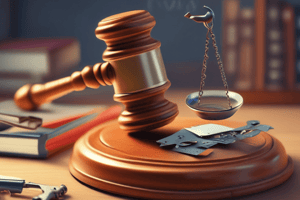Podcast
Questions and Answers
What standard is used to determine appropriate steps to avoid harm in negligence cases?
What standard is used to determine appropriate steps to avoid harm in negligence cases?
- What the court believes is fair and just
- What steps a reasonable person would take (correct)
- The most cost-effective measures available
- The defendant's personal feelings on the matter
Which of the following factors is NOT considered when determining breach of the duty of care?
Which of the following factors is NOT considered when determining breach of the duty of care?
- The difficulty of avoiding the harm
- The severity of potential harm
- The likelihood of harm
- The personal beliefs of the defendant (correct)
What must a plaintiff prove to establish causation in a negligence case?
What must a plaintiff prove to establish causation in a negligence case?
- That the harm would have occurred but for the defendant's conduct (correct)
- That they did not contribute to the harm
- That the harm was not foreseeable
- That the defendant intended to cause harm
Which statement about types of harm recognized in negligence is accurate?
Which statement about types of harm recognized in negligence is accurate?
In determining negligence, which of the following is a necessary condition for liability?
In determining negligence, which of the following is a necessary condition for liability?
What is required for damages to be apportioned in a negligence case?
What is required for damages to be apportioned in a negligence case?
Which principle is used to determine if negligence caused particular harm?
Which principle is used to determine if negligence caused particular harm?
What must the defendant's conduct do to establish liability in a negligence claim?
What must the defendant's conduct do to establish liability in a negligence claim?
Flashcards are hidden until you start studying
Study Notes
Breach of Duty of Care
- A reasonable person standard is used to determine if the defendant took appropriate steps to avoid harm
- The standard considers these factors:
- How likely was the harm?
- How great would the harm be?
- How difficult is it to avoid the harm?
- Is it justified to take the risk of the harm?
- Do policy considerations excuse the harm in question?
Causation
- To be liable, the defendant's conduct must directly result in harm to the plaintiff.
- This is a question of fact determined by:
- Common sense
- Experience
- Policy
- Value judgments
- The "but for" test asks if the harm would have occurred without the defendant's conduct.
- State and territory legislation now sets out similar principles to the common law test, it asks:
- Was the negligence a necessary condition of the occurrence of the harm?
- Is it appropriate for the scope of the negligent person's liability to extend to the harm?
- The plaintiff must prove, on the balance of probabilities, any fact relating to causation.
- If other events intervene as the proximate cause of the harm, the defendant is not liable.
- If a plaintiff contributed to their own harm (contributory negligence) losses must be apportioned.
Types of Harm Not Recognized
- Not all harm gives rise to liability.
- The harm must not be too remote, meaning:
- The defendant must have recognized the harm as a real possibility.
- The harm must not be very remote.
- The harm must not be beyond what would have been reasonably contemplated.
- Harm that cannot be quantified in monetary terms is not recognized.
- Ordinary grief or sorrow is not recognized as harm.
Studying That Suits You
Use AI to generate personalized quizzes and flashcards to suit your learning preferences.




